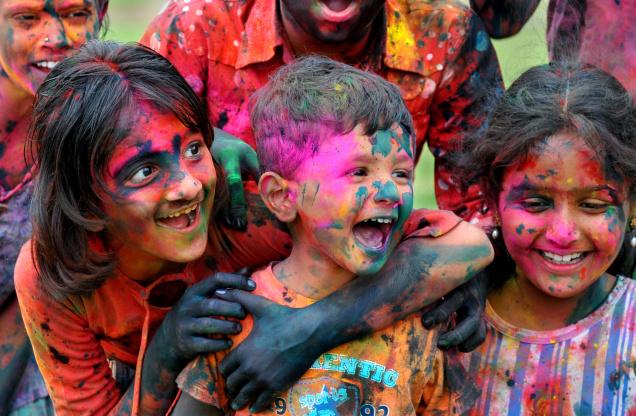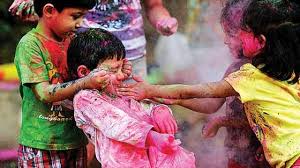Bharata’s Natya Shastra:
Written by Bharata Muni around 200 BCE deals with classical performing arts. In music, percussion instruments and dance, he deals in great detail with the topic of Combinatorics (Permutations and Combinations). He discusses about the rasas (unfortunately, there is no English word for rasa) that arise in a person while watching/listening to Classical art forms and how these rasas affect the mind of a person. In case of dance, he talks in detail about how the facial muscles have to be moved to generate a particular kind of rasa in the audience. It is the best guidebook for those who wish to pursue Classical art forms. Is there a detailed guide book in modern times that goes into the subtle nuances of art forms which will enable an artist to excel in his area?
Ayurveda:
Like any other shastra that originated in India, the goal of Ayurveda too is ‘Self-Realisation’. Ayuh+Veda=Ayurveda. Ayuh is defined as shareera indriya aatma samyogah – when all the three (body, senses and soul) come together, it is called Ayuh. Again, body, senses and soul don’t even come close to the exact definitions of shareera, indriya and aatma. The knowledge (Veda) that can lead one to Self-Realisation when all the three come together is Ayurveda. Ayurveda is not just a science of medicine. Major part of Ayurveda deals with the aspects of how to stay healthy. Follow the prescriptions in it and one will stay healthy. If someone doesn’t follow it well and falls ill, then how to cure their illness is discussed in the remaining part of Ayurveda. It is based on principles like – Kapha, Pitta and Vaata; Satva, Rajas and Tamas, which cannot be defined according to modern-day science. Based on these principles, the science of Ayurveda prescribes how a person can live a healthy life so that he can live a life of righteousness, become prosperous and fulfill his desires and get liberated from sorrows (Dharma, Artha, Kaama and Moksha). Before we put all this in the garage and label it as unscientific or primitive or based on some superstitions, let us look into the work of people like Prof. Thelma who are taking efforts to do experiments based on Ayurveda to see if we can find genes that cause disorders which the modern-day science have been trying to figure out and success seems to be a far away dream. A couple of links for a short read are:
http://genetics.du.ac.in/index.php?page=prof-b-k-thelma
http://www.theindiapost.com/education/gndu/ayurveda-indian-system-medicine-specialty-diagnosis-diseases-prof-thelma/
It would be interesting to compare the definition of health given by WHO recently and Ayurveda millenniums ago.
1. World Health Organization: – “Health is a state of complete physical, mental and social well-being and not merely the absence of disease or infirmity.”
2. Ayurveda – ‘Health is a state where in the Tridosha, Digestive fire, all the body tissues & components, all the physiological processes are in perfect unison and the soul, the sense organs and mind are in a state of total satisfaction (prasanna) & content”
Pedagogy:
Being a Mathematics teacher, I will talk about the issues with Mathematics education. Today, a topic like Combinatorics is dreaded by most students. If we teach them the topic using Music and Poetry as given in texts like Natya shastra, Sangitaratnakara, it will make a lot more sense and make the subject very beautiful (I have tried and tested this since past 4 years). Texts like Lilavati by Bhaskaracharya II give very good pedagogical aspects of how a topic can be taught to students. Learning ancient Indian texts not just give the knowledge but also subtler aspects like pedagogy, ethics, etc.
Logical and Rational Thinking:
One can afford to be illiterate but by being illogical one might have to pay a heavy price. How to use different ways of proving/disproving things? How to evaluate if the given information is correct or not? These are things that people of any profession has to do. Today, there is hardly any course that enables a person to enhance his logical thinking. The millennium old philosophies like Vaisheshika, Nyaya, Vedanta, etc. develop a rational thinking. How? Because all these philosophies have evolved over a period of time through discussions, debates and dialogues. They are not dogmas that were given by one single person for the whole of humanity. This way of learning also allows a person to be liberal in the true sense because he is open to new ideas and ready to change his stance if needed. The fact that there were very many different philosophies that co-existed in India in the past, that itself proves that it has to do something with the religious teachings which allowed them to accept/tolerate/respect people from other belief systems and not try to wipe them off.
Sanskrit:
When we talk about Sanskrit, what is generally missed in the Grammar structure of Sanskrit that Panini gave. Generally people think it is just about the language Sanskrit. But what is fascinating is the robust structure of Sanskrit grammar that Panini gave which can be applied to any language. Panini’s Ashtadhyayi gives the grammar rules that can make any language strong and not just Sanskrit. He uses iterations, recursions, formulae that can generate different words and much much more in a precise text which will not run into more than 50 pages. It for these reasons that it is been studied today by Computer Scientists and Linguists to see how Computer Science can benefit from Sanskrit in creating a better Machine Language.
Above all the other advantages of Sanskrit, what is most important is that the treasure box of knowledge that our ancestors possessed can be unlocked only with Sanskrit. We need to learn Sanskrit for the sake of unlocking the treasure box and taking out the pearls.
To conclude, these are just few areas where India stood in glory in the past. The list is very long and probably endless. It cannot be completed, but this writing has to conclude. Hence resting with only a few subjects where India contributed. There are lot of other areas like Yoga, Meditation, Mathematics, Pure Sciences, Philosophy, Music, Martial arts, Architecture, Engineering, Statecraft, Ethics, where India has contributed to the world.
The study of history is not (and should not) be just confined to taking the pride of a great ancestry but to see how it can be used today to make ourselves as better human beings resulting in a better world. Today the people who accept that Indic studies should be taken more seriously, they themselves should take efforts to study and learn more about Indian history before commenting about something so that they don’t fall prey to false claims. We should also not forget that by learning Indic traditions and culture one can make the future bright.
For those who don’t believe that Indic studies should not be glorified/studied, need to first take an effort to study before they comment. Man is an emotional being that has the capability to think rationally. But by nature, man is not a rational being. Even after we watch a movie that has enthralled us, we would be tempted to share and glorify about the movie. It is very natural. Some of us are not feeling the thrill in the scriptures probably because we have just went through it superficially and the arrogance of a modern-day educated man is not allowing us to accept the fact that we haven’t understood it well. It is not just one philosophy that we have to fit into, there are many which can appeal to our thoughts and we can find a place there.
For those who are indifferent, make an attempt to study Indian scriptures. Try.
#IndicStudies
#WhyStudyIndianScriptures
#WhyStudyHistory
#History
~ Notes from Seminar and Tutorials on Science and Technology in Indic Studies at IISc Bangalore Feb 3-6, 2017





